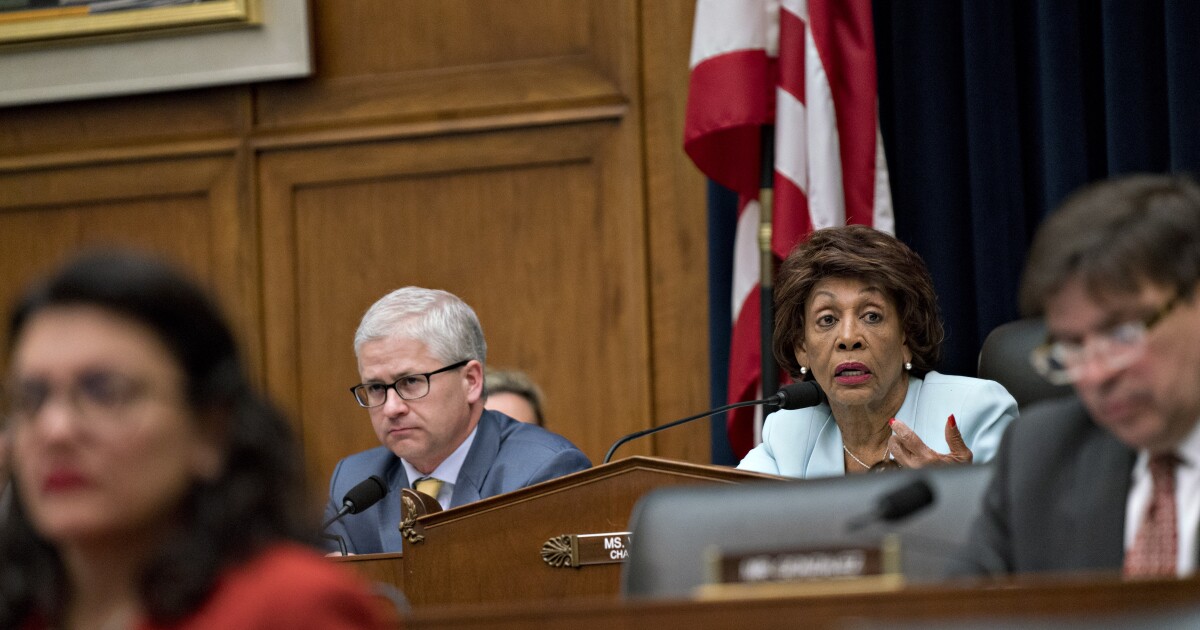Regulation
Is the latest crypto bill an opportunity for banks to circumvent regulation?

Rep. Maxine Waters, Democrat of California and ranking member of the House Financial Services Committee, said a Republican-led crypto bill could open the door for financial companies to escape SEC oversight. and Exchange Commission. Photographer: Andrew Harrer/Bloomberg
Andrew Harrer/Bloomberg
WASHINGTON-Crypto bill passed by unusually wide bipartisan margin in House could create a loophole allowing traditional financial companies – including banks – to circumvent stricter regulation.
Last month, the House voted in favor of a bill establishing a regulatory regime for cryptocurrencies, and the bill notably passed with rare bipartisan support. Seventy-one Democrats voted for the bill, including high-ranking party members like former House Speaker Rep. Nancy Pelosi of California.
The bill faces tougher challenges in the Senate, where Senate Banking Committee Chairman Sherrod Brown, D-Ohio, has been skeptical of crypto legislation that he sees as too favorable to the crypto industry.
But the House vote was a turning point for crypto in Washington, as more Democratic lawmakers appear interested in considering some sort of bill. Senate Majority Leader Chuck Schumer, D-N.Y., along with a group of mostly Northeast and West Coast Democrats, are becoming friendlier toward a narrow set of crypto issues, creating an opportunity for the crypto industry and for Republicans to find common ground and pass a bill establishing a regulatory regime for the industry.
A number of Democratic senators, including Schumer, voted in favor of the Congressional Review Act’s challenge to SEC Accounting Bulletin 121, which banks say effectively harms their ability to hold cryptocurrency. While Biden vetoed that challenge on Friday, the bill recently passed out of the House would have a very similar effect, prohibiting the SEC from making rules or issuing guidelines that would prevent banks from entering into the crypto custody sector.
Moving forward, a key part of the upcoming debate on the crypto bill – known as the “Financial Innovation and Technology for the 21st Century Act” or FIT21 – will be the implications of the bill not only on crypto, but also on traditional financial institutions. including banks.
Some Democratic members of the House of Representatives argued that the bill could make it easier for banks — typically large banks with established trading desks — and asset managers to create assets that would be overseen by Commodity and Futures Trading Commission rather than the Securities and Exchange Commission, which is generally considered to have a lighter regulatory touch.
Specifically, much of the concern revolves around a section titled “Clarity of Assets Offered Under an Investment Contract.” House Democrats argued that this section was added only in the most recent version of the legislation and after the bill was considered by the House Financial Services Committee.
“Language was added to the bill after it was marked up by the appropriate committees that would allow even some traditional titles to also exist in this regulatory no-man’s land,” said Rep. Maxine Waters, Democrat of California, at the press conference. Floor of the house.
The section describes the ways in which an “investment contract asset” – normally something that would fall under the jurisdiction of the SEC – would not be regulated by the SEC if it meets certain decentralization criteria, including that the transaction of the asset is recorded on a cryptographically secure medium. public ledger.
Graham Steele, a researcher at the Roosevelt Institute and until recently assistant secretary for financial institutions at the Treasury Department, said that under the bill, banks and other financial institutions could implement a blockchain system , subcontract this operation or separate from it, and then everything listed on this platform would be outside the scope of SEC regulation.
“There are ways for a bank to set up a blockchain network,” he said. “Anyone can self-certify to the SEC that the network and associated digital assets are decentralized. And then, assuming the SEC… doesn’t challenge that, it moves into the digital products space and is supervised by the CFTC.”
The risk of larger institutional players entering this market is twofold, Steele said. The CFTC requires fewer disclosures and offers consumers less protection than the SEC, which could harm consumers, and the entry of large traditional companies could create financial bubbles that threaten financial stability.
“There is therefore harm to the micro-consumer caused by investing in products and services and not necessarily having all the information necessary to understand the risks,” he said . “And then, secondly, you could have large incumbent financial institutions that would make these markets bigger and bigger, which could make it a financial stability issue.”
Lee Reiners, a lecturer at Duke Law who studies financial technology and crypto policy, said that in theory, a large non-bank financial company like BlackRock — which already has a tokenized fund — could bring some modifications to this offering to meet the definition in the bill. of what can be classified as merchandise. Reiners, along with a number of financial policy law academics and consumer groups, wrote to the House Financial Services Committee to voice these concerns to lawmakers.
“If you give Wall Street the opportunity to game the system and go for a lighter regulatory regime, they will,” he said. “You can imagine someone saying, ‘OK, if you don’t want to register with the SEC, just put it on the blockchain.'”
Republicans, for their part, say their bill does not pose this dilemma. Rep. French Hill, R-Ark., a lead sponsor of the legislation, said the bill specifically defines assets offered under an investment contract as securities, unless they are not otherwise defined as a title. This is part of a complex legal test called the Howey test established by a 1946 Supreme Court case.
“The minority has repeatedly charged that somehow a big securities loophole is open and wide in this bill,” he said. “That’s just not true, that’s just not a factual statement.”
Hill said the term “investment contract” is a “fungible digital representation” and that the bill specifically defines digital assets as not including notes, stocks, treasury bills and swaps based on titles.
“So this does not open the loophole that the senior member of the Financial Services Committee mentioned,” he said.
This assessment has also gained support from other experts. Zachary Zweihorn, a partner at Davis Polk, said the idea that financial institutions “can just put a blockchain label on something” and therefore fall outside the securities regulatory structure is not “realistic under the text Bill “.
“The way I see it, it says that an asset sold under an investment contract is not automatically a security,” said Zachary Zweihorn, a partner at Davis Polk. “Unless it’s otherwise a security, which is sort of circular.”
If a major bank or other financial institution creates an asset that meets the definition of a digital asset that should be regulated by the CFTC under the Republican crypto bill, Zweihorn said the CFTC could be the best place to regulate this asset.
“It’s hard to imagine a bank creating these types of assets that would meet this definition,” he said. “And you know, if they do it, then it’s probably not the worst idea to do it. [to the CFTC]”.
Regulation
Crypto community gets involved in anti-government protests in Nigeria

Amid the #EndBadGovernanceInNigeria protests in Nigeria, a notable shift is occurring within the country’s cryptocurrency sector. As the general public demands sweeping governance reforms, crypto community leaders are seizing the opportunity to advocate for specific regulatory changes.
Rume Ophi, former secretary of the Blockchain Stakeholders Association of Nigeria (SiBAN), stressed the critical need to integrate crypto-focused demands into the broader agenda of the protests.
Ophi explained the dual benefit of such requirements, noting that proper regulation can spur substantial economic growth by attracting investors and creating job opportunities. Ophi noted, “Including calls for favorable crypto regulations is not just about the crypto community; it’s about leveraging these technologies to foster broader economic prosperity.”
Existing government efforts
In opposition to Ophi’s call for action, Chimezie Chuta, chair of the National Blockchain Policy Steering Committee, presents a different view. He pointed out The Nigerian government continued efforts to nurture the blockchain and cryptocurrency industries.
According to Chuta, the creation of a steering committee was essential to effectively address the needs of the crypto community.
Chuta also highlighted the creation of a subcommittee to harmonize regulations for virtual asset service providers (VASPs). With the aim of streamlining operations and providing clear regulatory direction, the initiative involves cooperation with major organizations including the Securities and Exchange Commission (SEC) and the Central Bank of Nigeria (CBN). “Our efforts should mitigate the need for protest as substantial progress is being made to address the needs of the crypto industry,” Chuta said.
A united call for support
The ongoing dialogue between the crypto community and government agencies reflects a complex landscape of negotiations and demands for progress.
While actors like Ophi are calling for more direct action and the inclusion of crypto demands in protest agendas, government figures like Chuta are advocating for recognition of the steps already taken.
As protests continue, the crypto community’s push for regulatory reform highlights a crucial aspect of Nigeria’s broader fight to improve governance and economic policies. Both sides agree that favorable regulations are critical to the successful adoption and implementation of blockchain technologies, signaling a potentially transformative era for Nigeria’s economic framework.
Read also : OKX Exchange Exits Nigerian Market Amid Regulatory Crackdown
Regulation
Cryptocurrency Regulations in Slovenia 2024

Slovenia, a small but highly developed European country with a population of 2.1 million, boasts a rich industrial history that has contributed greatly to its strong economy. As the most economically developed Slavic nation, Slovenia has grown steadily since adopting the euro in 2007. Its openness to innovation has been a key factor in its success in the industrial sector, making it a prime destination for cryptocurrency enthusiasts. Many believe that Slovenia is poised to become a powerful fintech hub in Europe. But does its current regulatory framework for cryptocurrencies support such aspirations?
Let’s explore Slovenia’s cryptocurrency regulations and see if they can propel the country to the forefront of the cryptocurrency landscape. My expectations are positive. What are yours? Before we answer, let’s dig a little deeper.
1. Cryptocurrency regulation in Slovenia: an overview
Slovenia is renowned for its innovation-friendly stance, providing a supportive environment for emerging technologies such as blockchain and cryptocurrencies. Under the Payment Services and Systems Act, cryptocurrencies are classified as virtual assets rather than financial or monetary instruments.
The regulation of the cryptocurrency sector in Slovenia is decentralized. Different authorities manage different aspects of the ecosystem. For example, the Bank of Slovenia and the Securities Market Agency oversee cryptocurrency transactions to ensure compliance with financial laws, including anti-money laundering (AML) and terrorist financing regulations. The Slovenian Act on the Prevention of Money Laundering and Terrorist Financing (ZPPDFT-2) incorporates the EU’s 5th Anti-Money Laundering Directive (5MLD) and aligns with the latest FATF recommendations. All virtual currency service providers must register with the Office of the Republic of Slovenia.
2. Cryptocurrency regulation in Slovenia: what’s new?
Several notable developments have taken place this year in the cryptocurrency sector in Slovenia:
July 25, 2024:Slovenia has issued a €30 million on-chain digital sovereign bond, the first of its kind in the EU, with a yield of 3.65%, maturing on 25 November 2024.
May 14, 2024:NiceHash has announced the first Slovenian Bitcoin-focused conference, NiceHashX, scheduled for November 8-9 in Maribor.
3. Explanation of the tax framework for cryptocurrencies in Slovenia
The Slovenian cryptocurrency tax framework provides clear guidelines for individuals and businesses. According to the Slovenian Financial Administration, the tax treatment depends on the status of the trader and the nature of the transaction.
- People:Income earned from cryptocurrencies through employment or ongoing business activities is subject to personal income tax. However, capital gains from transactions or market fluctuations are exempt from tax.
- Companies:Capital gains from cryptocurrency-related activities are subject to a 19% corporate tax. Value-added tax (VAT) generally applies at a rate of 22%, although cryptocurrency transactions that are considered as means of payment are exempt from VAT. Companies are not allowed to limit payment methods to cryptocurrencies alone. Tokens issued during ICOs must follow standard accounting rules and corporate tax law.
4. Cryptocurrency Mining in Slovenia: What You Need to Know
Cryptocurrency mining is not restricted in Slovenia, but income from mining is considered business income and is therefore taxable. This includes rewards from validating transactions and any additional income from mining operations. Both individuals and legal entities must comply with Slovenian tax regulations.
5. Timeline of the development of cryptocurrency regulation in Slovenia
Here is a timeline highlighting the evolution of cryptocurrency regulations in Slovenia:
- 2013:The Slovenian Financial Administration has issued guidelines stating that income from cryptocurrency transactions should be taxed.
- 2017:The Slovenian Financial Administration has provided more detailed guidelines on cryptocurrency taxation, depending on factors such as the status of the trader and the type of transaction.
- 2023:The EU adopted the Markets in Crypto-Assets (MiCA) Regulation, establishing a uniform regulatory framework for crypto-assets, their issuers and service providers across the EU.
Endnote
Slovenia’s approach to the cryptocurrency sector is commendable, reflecting its optimistic view of the future of cryptocurrencies. The country’s balanced regulatory framework supports cryptocurrency innovation while protecting users’ rights and preventing illegal activities. Recent developments demonstrate Slovenia’s commitment to continually improving its regulatory environment. Slovenia’s cryptocurrency regulatory framework sets a positive example for other nations navigating the evolving cryptocurrency landscape.
Read also : Hong Kong Cryptocurrency Regulations 2024
Regulation
A Blank Sheet for Cryptocurrencies: Kamala Harris’ Regulatory Opportunity

photo by Shubham Dhage on Unsplash
As the cryptocurrency landscape continues to evolve, the need for clear regulation has never been more pressing.
With Vice President Kamala Harris now leading the charge on digital asset regulation in the United States, this represents a unique opportunity to start fresh. This fresh start can foster innovation and protect consumers. It can also pave the way for widespread adoption across industries, including real estate agencies, healthcare providers, and online gaming platforms like these. online casinos ukAccording to experts at SafestCasinoSites, these platforms come with benefits such as bonus offers, a wide selection of games, and various payment methods. Ultimately, all this increase in adoption could propel the cryptocurrency market forward.
With this in mind, let’s look at the current state of cryptocurrency regulation in the United States, a complex and confusing landscape. Multiple agencies, including the Securities and Exchange Commission (SEC), the Commodity Futures Trading Commission (CFTC), and the Financial Crimes Enforcement Network (FinCEN), have overlapping jurisdictions, creating a fragmented regulatory environment. This lack of clarity has stifled innovation as companies are reluctant to invest in the United States, fearing regulatory repercussions. A coherent and clear regulatory framework is urgently needed to realize the full potential of cryptocurrencies in the United States.
While the US struggles to find its footing, other countries, such as Singapore and the UK, are actively looking into the cryptocurrency sector by adopting clear and supportive regulatory frameworks. This has led to a brain drain, with companies choosing to locate in more conducive environments.
Vice President Kamala Harris has a unique opportunity to change that narrative and start over. Regulation of cryptocurrencies. By taking a comprehensive and inclusive approach, it can help create a framework that balances consumer protection with innovation and growth. The time has come for clear and effective regulation of cryptocurrencies in the United States.
Effective regulation of digital assets is essential to foster a safe and innovative environment. The key principles guiding this regulation are clarity, innovation, global cooperation, consumer protection, and flexibility. Clear definitions and guidelines eliminate ambiguity while encouraging experimentation and development to ensure progress. Collaboration with international partners establishes consistent standards, preventing regulatory arbitrage. Strong safeguards protect consumers from fraud and market abuse, and adaptability allows for evolution in response to emerging trends and technologies, striking a balance between innovation and protection.
The benefits of effective cryptocurrency regulation are multiple and far-reaching. By establishing clear guidelines, governments can attract investors and mainstream users, driving growth and adoption. This can, in turn, position countries like the United States as global leaders in fintech and innovation. Strong safeguards will also increase consumer confidence in digital assets and related products, increasing economic activity.
A thriving crypto industry can contribute significantly to GDP and job creation, which has a positive impact on the overall economy. Furthermore, effective regulation has paved the way for the growth of many businesses such as tech startups, online casinos, and pharmaceutical companies, demonstrating that clear guidelines can open up new opportunities without stifling innovation. This is a great example of how regulation can allay fears of regressive policies, even if Kamala Harris does not repeal the current progressive approach. By adopting effective regulation, governments can create fertile ground for the crypto industry to thrive, thereby promoting progress and prosperity.
Regulation
South Korea Imposes New ‘Monitoring’ Fees on Cryptocurrency Exchanges

Big news! The latest regulatory changes in South Korea are expected to impact major cryptocurrency exchanges like Upbit and Bithumb. Under the updated regulations, these platforms will now have to pay monitoring fees, which could cause problems for some exchanges.
Overview of new fees
In the latest move to regulate cryptocurrencies, the Financial Services Commission announced on July 1 the revised “Enforcement Order of the Act on the Establishment of the Financial Services Commission, etc.” update “Regulations on the collection of contributions from financial institutions, etc.” According to local legislation newsThe regulations require virtual asset operators to pay supervisory fees for inspections conducted by the Financial Supervisory Service starting next year. The total fees for the four major exchanges are estimated at around 300 million won, or about $220,000.
Apportionment of costs
Upbit, which holds a dominant market share, is expected to bear more than 90% of the total fee, or about 272 million won ($199,592) based on its operating revenue. Bithumb will pay about 21.14 million won ($155,157), while Coinone and GOPAX will contribute about 6.03 million won ($4,422) and 830,000 won ($608), respectively. Korbit is excluded from this fee due to its lower operating revenue.
Impact on the industry
The supervision fee will function similarly to a quasi-tax for financial institutions subject to inspections by the Financial Supervisory Service. The new law requires any company with a turnover of 3 billion won or more to pay the fee.
In the past, fees for electronic financial companies and P2P investment firms were phased in over three years. However, the taxation of virtual asset operators has been accelerated, reflecting the rapid growth of the cryptocurrency market and increasing regulatory scrutiny.
Industry reactions
The rapid introduction of the fee was unexpected by some industry players, who had expected a delay. Financial Supervisory Service officials justified the decision by citing the creation of the body concerned and the costs already incurred.
While larger exchanges like Upbit and Bithumb can afford the cost, smaller exchanges like Coinone and GOPAX, which are currently operating at a loss, could face an additional financial burden. This is part of a broader trend of declining trading volumes for South Korean exchanges, which have seen a 30% drop since the new law went into effect.
-

 Regulation12 months ago
Regulation12 months agoRipple CTO and Cardano founder clash over XRP’s regulatory challenges ⋆ ZyCrypto
-

 Regulation10 months ago
Regulation10 months agoNancy Pelosi Considers Supporting Republican Crypto Bill FIT21 – London Business News
-

 Videos12 months ago
Videos12 months agoCryptocurrency News: Bitcoin, ETH ETF, AI Crypto Rally, AKT, TON & MORE!!
-

 Regulation12 months ago
Regulation12 months agoBitcoin’s future is ‘bleak’ and ripe for regulation, says lead developer
-

 News9 months ago
News9 months agoAave Price Increases Following Whales Accumulation and V3.1 Launch
-

 Regulation9 months ago
Regulation9 months agoSouth Korea Imposes New ‘Monitoring’ Fees on Cryptocurrency Exchanges
-

 Regulation9 months ago
Regulation9 months agoA Blank Sheet for Cryptocurrencies: Kamala Harris’ Regulatory Opportunity
-

 Regulation9 months ago
Regulation9 months agoCryptocurrency Regulations in Slovenia 2024
-

 News12 months ago
News12 months agoThe trader earned $46 million with PEPE after reaching a new ATH
-

 Regulation11 months ago
Regulation11 months agoCrypto needs regulation to thrive: Tyler Cowen
-

 Blockchain11 months ago
Blockchain11 months agoSolana ranks the fastest blockchain in the world, surpassing Ethereum, Polygon ⋆ ZyCrypto
-

 Blockchain11 months ago
Blockchain11 months agoSolana Surpasses Ethereum and Polygon as the Fastest Blockchain ⋆ ZyCrypto

















